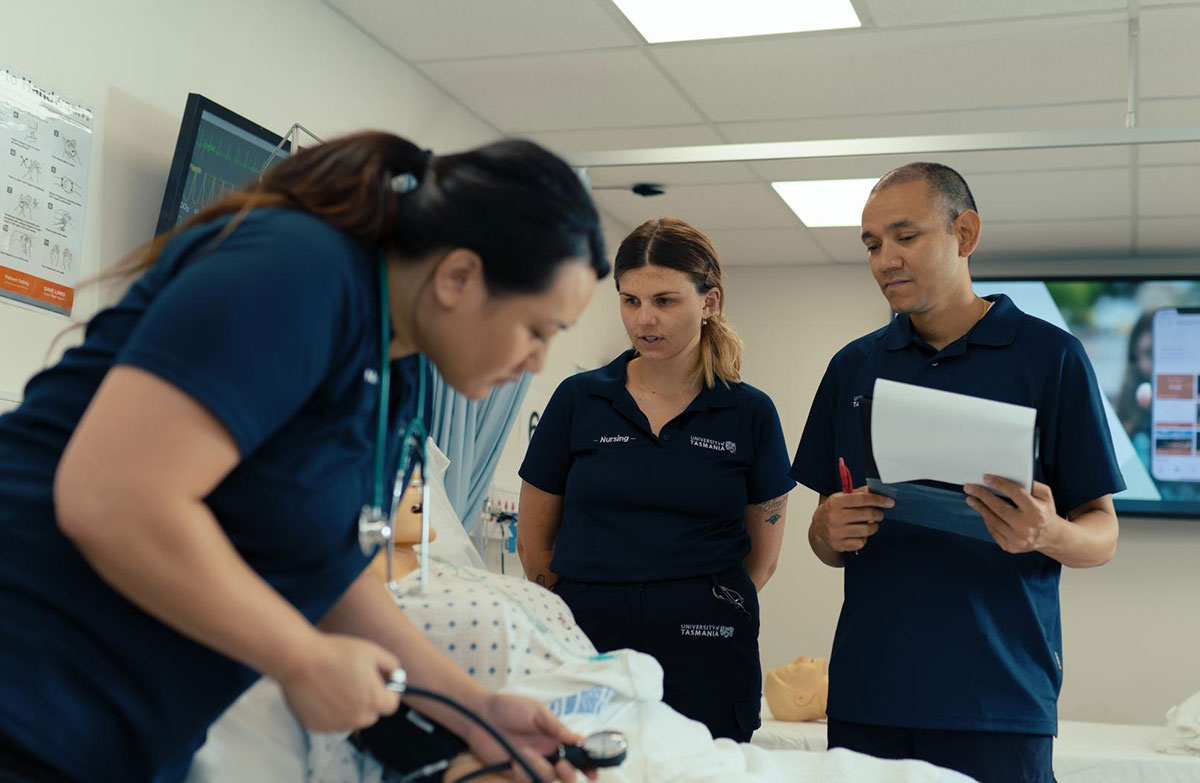Taught by experts with real experience
Learn from practicing clinical experts for an authentic learning experience
Engage with fellow students
Build support networks and making lifelong connections
Generous scholarships for partner employees
Scholarships are available for valued members of our vast partner network
Specialist skills and knowledge to advance your nursing career
Ready to take the leap and advance your nursing career? Choose from over 20 specialisations and learn amongst a collaborative community with online learning designed specifically for the busy, working professional.
Whether you’re in the early stages of your career, working in an area of specialisation, or moving into a role that encourages you to lead and manage, our courses and wide range of specialisations will support your lifelong learning goals.
To help you advance your career, generous scholarships are available to employees of our valued industry partners.
Specialisation options
Acute care involves the treatment of patients diagnosed with short term but serious conditions. This specialisation explores illness, patient deterioration, and the politics of power in the wider care setting.
Available to study in the Graduate Certificate in Nursing, Graduate Diploma of Nursing, or Master of Clinical Nursing.
Addiction Studies explores the context of addiction, assessment and management of addictive disorders, as well as approaches to intervention.
(Semester 1 entry only)
Available to study in the Graduate Certificate in Addiction Studies, Graduate Diploma of Nursing, or Master of Clinical Nursing.
Explore the foundations of perioperative nursing, interpreting patient deterioration, and focus on the complex health care needs of patients requiring anaesthetic and recovery room nursing care.
Available to study in the Graduate Certificate in Nursing, Graduate Diploma of Nursing, or Master of Clinical Nursing.
A look into integrated nursing care for patients with conditions affecting the cardiovascular system.
Available to study in the Graduate Certificate in Nursing, Graduate Diploma of Nursing, or Master of Clinical Nursing.
This area examines the changing philosophies that have underpinned the practice of child and family health nurses. Child and Family Health combines clinical practice and online learning.
(Semester 1 entry only)
Available to study in the Graduate Certificate in Nursing, Graduate Diploma of Nursing, or Master of Clinical Nursing.
Study the internal and external factors of existing healthcare models, while examining the practical application of simulation to replicate and teach aspects of healthcare practice.
Available to study in the Graduate Certificate in Nursing, Graduate Diploma of Nursing, or Master of Clinical Nursing.
Critical Care allows for the understanding and exploration of patient management skills in complex critical care situations. This includes patient deterioration and scientific theories related to nursing critically ill patients with single and multi-organ systems failure.
(Semester 1 entry only)
Available to study in the Graduate Certificate in Nursing, Graduate Diploma of Nursing, or Master of Clinical Nursing.
Develop an understanding of the principles of triage, while the examining theories and principles of trauma and acutely unwell patients. You’ll also learn to relate these to a number of common clinical presentations.
(Semester 1 entry only)
Available to study in the Graduate Certificate in Nursing, Graduate Diploma of Nursing, or Master of Clinical Nursing.
Explore healthy aging in contemporary professional practice, as well as preparedness to care for people in the last year of their lives, and the concepts of mental health wellbeing and dementia care.
Available to study in the Graduate Certificate in Nursing, Graduate Diploma of Nursing, or Master of Clinical Nursing.
Develop an understanding of acute illness and how this is applied in the context of complex health conditions. Recognise the essential concepts of health assessment that can be applied in any situation.
Available to study in the Graduate Certificate in Nursing, Graduate Diploma of Nursing, or Master of Clinical Nursing.
An introduction to what leadership means for the Registered Nurse in contemporary nursing practice. Focus on the theory underpinning Practice Development to enable and enhance your individual leadership capabilities, skills and knowledge within your own practice setting.
(Semester 1 entry only)
Available to study in the Graduate Certificate in Nursing, Graduate Diploma of Nursing, or Master of Clinical Nursing.
An opportunity to employ a critical, reflective, and problem-based learning approach to support the development of knowledge, skill and attitudinal competencies required for effective practice.
(Semester 1 entry only)
Available to study in the Graduate Certificate in Nursing, Graduate Diploma of Nursing, or Master of Clinical Nursing.
Neonatal Intensive Care explores the interplay of biological and ecological factors that relate to the development of resilience in neonates, infants, children and adolescents within a family centred framework. You’ll be equipped to provide comprehensive and therapeutic nursing care to critically ill newborns, the growing premature infant, and their families.
Available to study in the Graduate Certificate in Nursing, Graduate Diploma of Nursing, or Master of Clinical Nursing.
Neuroscience provides clinically focussed content that will enable you to critically analyse current neurological and neurosurgical theory and practices. You’ll apply an evidence-based approach to understanding care, diagnostics, and management of the patient with neurological conditions.
Available to study in the Graduate Certificate in Nursing, Graduate Diploma of Nursing, or Master of Clinical Nursing.
Oncology examines altered cell biology, epidemiology and the technologies used to detect and treat cancer. Non-evidence based treatments for cancer are also discussed.
Available to study in the Graduate Certificate in Nursing, Graduate Diploma of Nursing, or Master of Clinical Nursing.
Learn the role of the orthopaedic nurse in the clinical area, examining the musculoskeletal system and health assessment in relation to orthopaedic conditions.
Available to study in the Graduate Certificate in Nursing, Graduate Diploma of Nursing, or Master of Clinical Nursing.
Explore the interplay of biological and ecological factors that relate to the development of resilience in neonates, infants, children and adolescents within a family centred framework.
Available to study in the Graduate Certificate in Nursing, Graduate Diploma of Nursing, or Master of Clinical Nursing.
Develop perioperative clinical skills based on ACORN principles of practice. Competency development is supported by clinical preceptors, clinical educators and academics, and you’ll explore the theoretical components of perioperative nursing.
(Semester 1 entry only)
Available to study in the Graduate Certificate in Nursing, Graduate Diploma of Nursing, or Master of Clinical Nursing.
Gain advanced knowledge, skills and analysis of primary health care (PHC), both in critical thinking and the application of PHC research to practice. You’ll explore primary health principles, philosophy, approaches and frameworks for working in a variety of roles.
(Semester 1 entry only)
Available to study in the Graduate Certificate in Nursing, Graduate Diploma of Nursing, or Master of Clinical Nursing.
This specialisation focusses on your acquired knowledge of existing health service models. You’ll learn about he internal and external factors that influence the delivery of quality services, and the best-practice models for quality service design.
Available to study in the Graduate Certificate in Nursing, Graduate Diploma of Nursing, or Master of Clinical Nursing.
Learn to understand the complex needs of the person requiring rehabilitation nursing. Through exploration of the literature, you’ll explore theories of disability, epidemiology and rehabilitation principles to guide development of the rehabilitation nurse.
Available to study in the Graduate Certificate in Nursing, Graduate Diploma of Nursing, or Master of Clinical Nursing.
Explore the pathogenesis of renal disease and the management of patients with acute, chronic and end stage diseases. You’ll also address the principles of renal nursing, including the psychological, ethical and sociological domains of health.
Available to study in the Graduate Certificate in Nursing, Graduate Diploma of Nursing, or Master of Clinical Nursing.

Health partner scholarships
To help you advance your career, we offer generous scholarships to our valued partner employees. Search for your employer, speak to your workplace or contact us on 13 8827 to find out more.
Course options
We offer a range of course options designed to meet your professional and personal goals in the healthcare sector.
Total 4 units (50 credit points)
| Total 8 units (100 credit points)
| Total 10 units (150 credit points)
|
Other postgraduate course options
- Duration: 1 year, up to 3 years part-time
- Location: Online
In this fully online course, you will work with both health and non-health professionals to improve your understanding of dependency and contribute to providing effective care and guidance to help those experiencing addiction to overcome their struggles.
Your studies will cover the principals underlying substance use and withdrawal, identification of co-occurring conditions, and the rationale for undertaking bio-psychosocial clinical assessments for clients.
You will also learn about policy and strategies which direct appropriate client management processes, as well as gain an understanding of current legislative requirements. You will learn strategies for working with people with addictive behaviours through the application of contemporary mental health improvement therapies.
- Duration: 1 year, up to 3 years part-time
- Location: Online
People with addictive behaviours through the application of contemporary mental health improvement therapies.
The Graduate Certificate in Therapeutic Medication Management is designed for experienced Registered Nurses or Registered Midwives looking to develop knowledge and enhanced practical skills in therapeutic medication management. Using an ‘across the lifespan’ approach, concepts such as prescribing, administering, monitoring, and evaluating medications in accordance with Commonwealth and State legislation and policy will be explored.
Career outcomes
Upon graduating, you will have a deeper understanding of the nursing practice, including the ability to address crucial challenges and adapt to continuous changes but also be ideally suited for leadership roles and career progression. Health care and Social Assistance is the largest employing industry in Australia, with job opportunities estimated to grow up to 15% over the next three years.*
